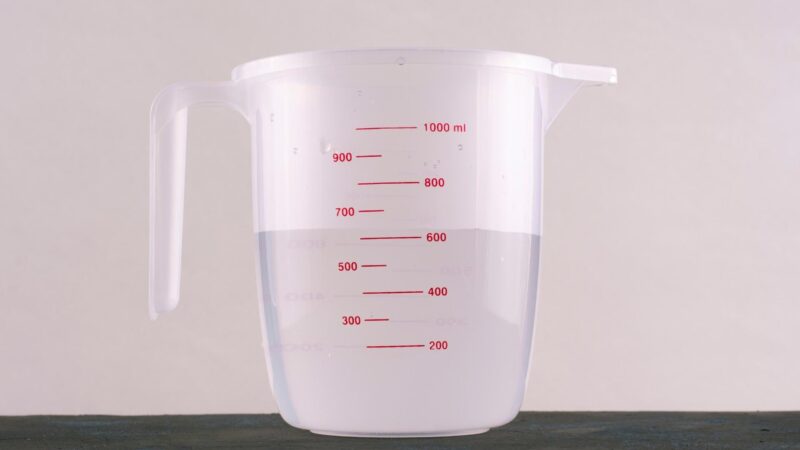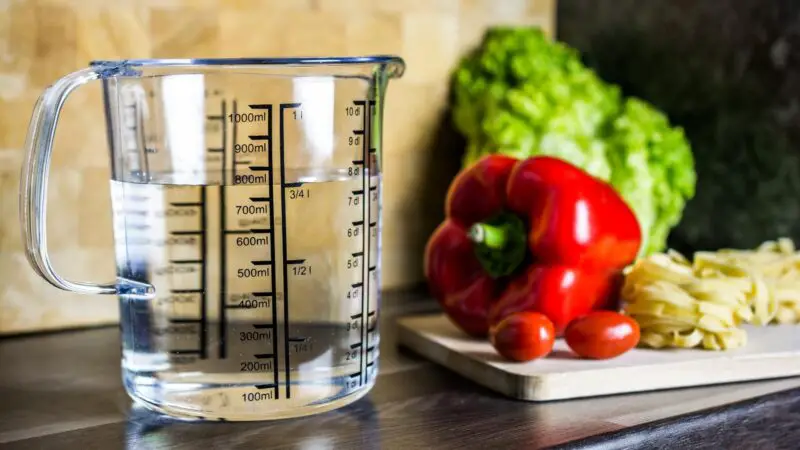Water is the most essential substance for living things. We were taught that it is important to drink enough water so our body can function properly. Water is essential for plants too, who use water to carry out photosynthesis and grow. Animals need water, too—for drinking, breathing, and cooling their bodies as they move around.
If we have a big bucket filled with water, it would have a high density since it has a lot of mass. On the other hand, if we have a small bucket that contains only a small amount of water, it will be less dense than before because it has less mass and volume.
Water is an abundant resource, but it’s also an extremely heavy one. The density of water is 1 g/ml, meaning that a full gallon weighs 8.34 pounds (3.7 kg). In this article, you will learn more about how much water weighs in various measurements and other interesting facts about it!
Different Types of Water Measurements

Cubic Foot
The use of cubic feet is to determine the amount of space that is being occupied by an object. Liquid volume is also measured in cubic feet. This is the amount of liquid that can be contained in one cubic foot of space and is used to calculate the weight of a liquid. The cubic foot is a US Customary unit of measurement used primarily in the United States and its territories.
Liter
The use of liters is primarily for liquid measurement. It is used in a variety of contexts, including chemical labs, food service, and home cooking. The use of a liter for liquids is a convenient way to measure the amount of liquid in a container. Countries like Canada and New Zealand use liters as measurements for beverages.
Gallon
A gallon is a unit of measurement used in both the United States and Canada for liquid volume. It is defined as 231 cubic inches, which is about 4.54 liters. The US gallon, also known as the liquid gallon, has a volume of 231 cubic inches. The UK gallon is slightly larger in volume at 277 cubic inches.
Ounce
An ounce is a unit of measurement equal to 1/16 of a pound. It is used to measure weight and mass, but it can also be used to measure liquid volume. An ounce is the weight measurement for avoirdupois ounces. This type of ounce is also known as the troy ounce, and it’s used to measure precious metals like gold and silver.
Pound
The pound (abbreviated to lb) is the unit of mass used in the imperial and United States customary systems of measurement. Unlike avoirdupois, which is used in the imperial system, the pound is an apothecary’s weight—it is not truly a measure of mass but rather an arbitrary standard for weighing precious metals and stones.
Measuring water using pounds is a very common practice in the US and elsewhere. It is used for both bulk and liquid measurement. Bulk measurement involves weighing the object, while liquid measurement involves measuring volume.
Acre-Foot
An acre-foot is a unit of measurement for water volume. It is equal to the amount of water needed to cover an acre of the surface with one foot of depth. An acre-foot is a unit of measurement used to quantify the amount of water that passes through an opening in one acre of land per second. It is approximately equal to 325,851 cubic feet, or 326,000 gallons.
How Much Does Water Weigh?

The answer depends on the quantity of water and where you’re weighing it. If you’re weighing a cup of water at home, then 1 cup is equal to 8 fluid ounces (fl. oz.). A big container of water with a full amount of water will yield a bigger weight than a smaller one.
What’s the Difference Between the Weight of Freshwater and Seawater?
Freshwater weighs less than seawater because it contains less salt, which makes it lighter. Seawater, on the other hand, has a lot of salt, so it’s heavier than freshwater.
Frequently Asked Questions
How Much Does a Cup of Water Weigh?
That depends on the type of cup you’re using. If you use a standard measuring cup, it will weigh about 8 ounces. If you use a measuring cup with an imperial measurement system, such as those found in Europe or Australia, the weight will be slightly higher—roughly 9 ounces.
How Much Does a Bottle of Water Weigh?
There is a wide range of bottle sizes available in the market, and they can vary from 8 ounces to 16 ounces. The size depends on the manufacturer and their preference.
How Much Does 16 Oz of Water Weigh?
The weight of water is generally assumed to be one pound per 16 ounces. This means if you’re holding out your glass and asking how much water is in it, you’ll probably be told 16 ounces. If you are asked how much water weighs in pounds, however, the answer is almost always “1 pound per 16 ounces.”
How Much Does 3 Liters of Water Weigh?
The idea is that one liter of water weighs one kilogram. That is to say, three liters of water weighs three kilograms.
How Much Does 1 Gallon of Water Weigh?
1 gallon of water weighs approximately 8.34 pounds.
How Much Does 5 Gallons of Water Weigh?
Five gallons of water weighs about 42 pounds.
How Much Does 10 Gallons of Water Weigh?
10 Gallons of water weigh approximately 84 lbs.
How Much Does 20 Gallons of Water Weigh?
Twenty gallons of water weigh about 167 lbs.
How Much Does 30 Gallons of Water Weigh?
Thirty gallons of water is approximately 250 lbs.
How Much Does 40 Gallons of Water Weigh?
It is equivalent to 334 lbs.
How Much Does 50 Gallons of Water Weigh?
This is equivalent to 417 pounds.
How Much Does 55 Gallons of Water Weigh?
Approximately, fifty-five gallons of water is 459 pounds.
How Much Does 100 Gallons of Water Weigh?
A hundred gallons of water weigh approximately 844 lbs.
How Much Does 200 Gallons of Water Weigh?
Two hundred gallons of water is 1670 lbs.
How Much Does 250 Gallons of Water Weigh?
Two hundred fifty gallons of water weigh about 2,086 lbs.
How Much Does 300 Gallons of Water Weigh?
Three hundred gallons of water weigh about 2500 lbs.
Put simply, one gallon of water weighs 8.34 lb. The weight of the water will always depend on how big or small its container is. Its weight is directly proportional to the size of its container. The containers you carry water in dictate how much you’re carrying in terms of weight.
List of Sources
Apothecary Scales and Weight Systems Such As Avoirdupois and Troy
